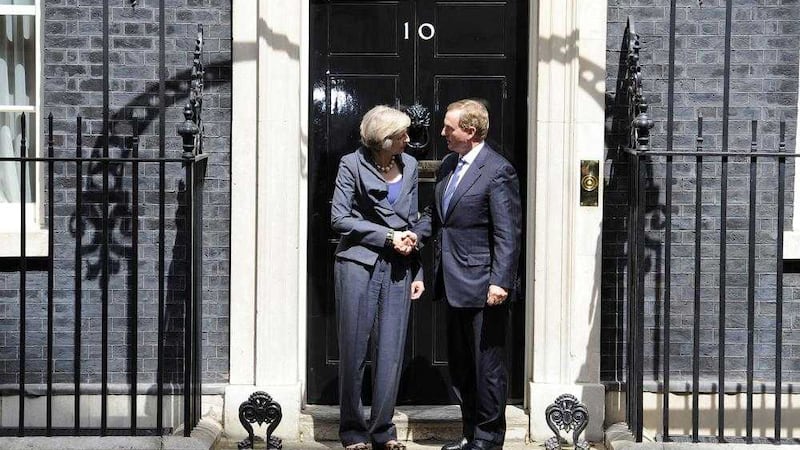LONDON and Dublin are agreed there will be no return to a hard border between the north and the Republic, taoiseach Enda Kenny insisted after Downing Street talks.
Mr Kenny said that he and Prime Minister Theresa May are both against creating a post-Brexit string of customs posts on the island of Ireland.
"I do not favour, and would not agree to, a hard border with a whole range of customs posts, and neither does the prime minister.
"There will be no hard border from Dundalk to Derry in the context of it being a European border, and by that I mean customs posts every mile along the road.
"We are both agreed very firmly there will be no return to a hard border as existed," Mr Kenny said to reporters outside Number Ten following the meeting.
Speaking earlier at a joint briefing with Mr Kenny, the Prime Minister said she was determined to maintain "the closest possible relationship" between Britain and the Republic following withdrawal from the EU.
Mrs May said there was a "strong will" to preserve free travel across the border between Northern Ireland and the Republic after Britain leaves the EU, and suggested that this could involve a common approach to the use of data on passengers arriving from outside the British Isles.
"I recognise that one of the biggest concerns for people is the common travel area. We benefited from a common travel area between the UK and the Republic of Ireland for many years before either country was a member of the EU.
"There is a strong will on both sides to preserve it and so we must now focus on securing a deal that is in the interests of both of us.
"Alongside this, we should continue our efforts to strengthen the external borders of the common travel area; for example, through a common approach to the use of passenger data," the PM said.
The outcome of last month's Brexit referendum will not undermine the peace process, the prime minister insisted.
On the peace process, Mrs May said: "It is in all our interests to work together to safeguard our national security and the outcome of the referendum will not undermine it.
"We are both fully committed to working together in support of the Northern Ireland Executive to build a better, stronger, safer future for the people of Northern Ireland.
"Indeed, it is vital that we keep up the momentum on tackling paramilitary groups and building a shared future.
"And today we have reaffirmed our commitment to establishing a new Independent Reporting Commission by the end of this year, which will support these efforts."
At the joint briefing, Mr Kenny said: "We both recognised that Ireland is the only EU member state that shares a land border with the UK. We are in agreement that we don't wish to see any return to the borders of the past on the island of Ireland."
Following her talks with the leaders of Germany, France and Ireland, Mrs May is continuing her round of whirlwind diplomacy with a visit to Rome to meet prime minister Matio Renzi on Wednesday.
This will be followed on Thursday by a trip to Slovakia and Poland, where she will hold discussions with Prime Ministers Robert Fico and Beata Szydlo, as part of her drive to engage with European leaders on Brexit.
A Number 10 spokesman said Mrs May wanted an early visit to Italy after becoming PM earlier this month, because of the close relations it has with the UK.
Thursday's trip to eastern Europe may prove more awkward as Slovakia and Poland are among the EU states most insistent on maintaining free movement of labour, and have also voiced concern about the rights of their nationals currently in the UK.
The countries are part of the Visegrad Four group within the EU which has called for the pace of integration to be slowed in the wake of Brexit.
Slovakia currently holds the six-month rotating presidency of the European Council and will host a summit of the remaining 27 states in Britain's absence in September to discuss their approach to the UK's planned withdrawal.








